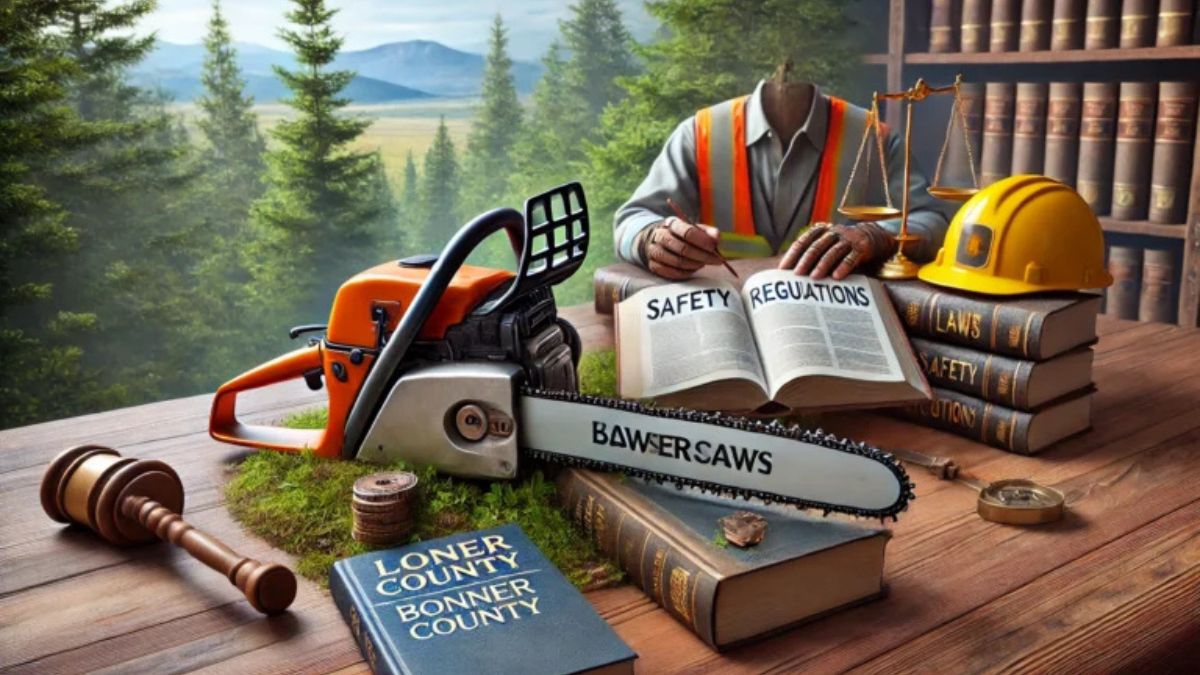LAW
Bonner Count Law On Using Chainsaws: A Deep Dive

Chainsaws are powerful tools that can make quick work of trees and brush, but with great power comes great responsibility. In Bonner County, the scenic landscapes demand not just skilful hands but also a keen understanding of regulations governing chainsaw use. Whether you’re clearing your property or managing woodland areas, knowing the law is crucial. Failing to adhere to these guidelines could lead to accidents or legal troubles. Let’s delve into the ins and outs of Bonner County law on using chainsaws, ensuring you’re well-informed before firing up that engine!
Why Chainsaws are Regulated in Bonner County
Chainsaws are powerful tools, and with great power comes the need for regulation. In Bonner County, the beauty of nature is matched only by its responsibility to protect it. Chainsaws can easily cause irreversible damage if misused.
The dense forests and diverse wildlife require careful management. Unregulated use can lead to deforestation, habitat destruction, and soil erosion. Local authorities aim to maintain ecological balance while allowing residents access to their land.
Additionally, safety is a significant concern. Chainsaw accidents can result in severe injuries or fatalities if proper precautions aren’t taken. Regulations help ensure that users are trained and equipped with the right knowledge before tackling tree work.
By setting rules around chainsaw usage, Bonner County strives to create a safer environment for both people and nature alike. This proactive approach fosters respect for local resources while promoting responsible ownership of such potent equipment.
Understanding the Rules and Requirements for Chainsaw Use
Using a chainsaw in Bonner County comes with specific rules that everyone should know. These regulations ensure safety for both the user and the surrounding community.
First, operators must possess a valid permit. This document confirms that you’ve completed the necessary training on safe chainsaw operation.
Next, there are restrictions on where you can use your chainsaw. Certain areas may be off-limits to prevent accidents or damage to local wildlife habitats.
Additionally, it’s essential to follow noise ordinances. Chainsaws can be quite loud, so check local guidelines regarding permissible hours of operation.
Always consider environmental factors such as wind direction and weather conditions before starting any cutting activity. Understanding these requirements helps promote responsible use while protecting yourself and others from potential hazards associated with chainsaw operations.
Safety Measures and Precautions for Using Chainsaws
Using a chainsaw can be exhilarating, but safety should always come first. Before starting, ensure you wear appropriate personal protective equipment (PPE). This includes gloves, goggles, helmets, and sturdy boots to guard against potential injuries.
Familiarize yourself with the chainsaw’s controls before use. Understand how to start it safely and where all emergency shut-off switches are located. A moment of preparation can prevent accidents later on.
Always maintain a firm grip on the saw while operating it. Keep your hands away from the cutting area and never attempt to cut above shoulder height. Stability is key when working on uneven ground or ladders.
Be mindful of your surroundings too. Clear any debris that could cause tripping hazards and make sure no one is nearby while you work.
Stay focused—avoid distractions like phone calls or conversations during operation for maximum concentration.
Tips for Proper Maintenance of a Chainsaw
Proper maintenance is key to ensuring your chainsaw operates efficiently. Regularly check the chain tension; a loose chain can lead to accidents and poor cutting performance. Aim for a snug fit without excessive tightness.
Cleaning your chainsaw after use is essential. Remove sawdust and debris from the air filter, bar, and chain. This helps maintain airflow and prevents overheating.
Sharpening the chain regularly enhances cutting ability. A dull blade requires more force, increasing wear on both you and the tool.
Don’t forget about lubrication! Ensure that oil flows freely to reduce friction between moving parts. Use high-quality oil specifically designed for chainsaws.
Inspect spark plugs periodically as well. They play a crucial role in starting your machine effectively and maintaining its power output.
Store your chainsaw in a dry place away from direct sunlight to prolong its lifespan.
Consequences of Not Following the Chainsaw Laws in Bonner County
Violating the chainsaw regulations in Bonner County can lead to serious repercussions. Fines are often imposed on those who misuse or disregard safety guidelines. These penalties serve as a strong reminder of the importance of adherence.
In some cases, repeated offences may result in more severe consequences, including potential criminal charges. This could tarnish your record and affect future opportunities regarding land use or permits.
Beyond legal ramifications, improper chainsaw usage can also endanger lives. Accidents often occur when individuals neglect safety protocols, leading to injuries that could have been easily avoided.
Additionally, property damage from reckless cutting practices might incur costly repairs and liabilities. It’s essential to recognize that compliance not only protects you but also ensures the safety of those around you.
Ignoring these laws could ultimately disrupt community harmony and lead to stricter enforcement measures by local authorities.
Conclusion: Importance of Following Regulations for Safe and Legal Use of Chainsaws
Following the regulations surrounding chainsaw use in Bonner County is crucial. These laws ensure not only the safety of individuals using these powerful tools but also protect the environment and community at large. Understanding local requirements helps prevent accidents, injuries, and potential legal issues.
Adhering to established guidelines fosters a culture of responsibility among users. It promotes safe practices and encourages proper training for those who handle chainsaws. When everyone follows the rules, it leads to safer neighbourhoods and more sustainable forestry management.
Being informed about chainsaw laws can save you from hefty fines or legal troubles while ensuring that your yard work or timber projects go smoothly. Staying compliant with regulations is an essential part of being a responsible homeowner or contractor in Bonner County.
Respecting these laws benefits everyone involved—from individual users to the broader community. Empower yourself with knowledge and always prioritize safety when using a chainsaw in this beautiful region!
LAW
Navigating Complex Elder Law Issues with Confidence

Introduction to Elder Law
Elder law addresses the unique needs of older adults, including age discrimination, healthcare accessibility, powers of attorney, and living wills. As the elderly population grows, these legal services become vital to ensure respect, dignity, and protection in legal scenarios. Addressing these issues can significantly impact their quality of life. The intricate field of Elder Law is designed to help navigate these challenges, assisting families in preparing for future legal, health, and financial difficulties. Elder law is a specialized field that covers topics like healthcare directives, estate planning, guardianship, and elder abuse prevention. It is crucial in today’s aging world, where the elderly population is expected to grow. Effective planning can ease familial and financial pressures, ensure the execution of an elder’s wishes, and protect them from financial exploitation. Understanding elder law also prepares individuals to manage their legal and economic well-being, enhancing their quality of life during their golden years.
Common Legal Challenges in Elder Law
Older adults encounter various legal challenges, with healthcare costs and securing suitable housing being primary concerns. Many face difficulties accessing necessary medical services due to complex insurance policies or high expenses. Housing transitions, such as moving from a private residence to assisted living or a nursing home, require careful legal consideration. Additionally, estate planning is crucial in ensuring financial security and protecting assets for future generations. A Pew Research study highlights the significance of elder law in defending the rights and interests of older people by stating that bureaucratic roadblocks and regulatory complexity frequently necessitate expert legal assistance.
Planning for Incapacity and Long-Term Care
One of the most emotionally challenging aspects of aging is planning for potential incapacity and the need for long-term care. It is prudent to engage in preemptive planning, including drafting healthcare directives that clearly outline one’s wishes concerning medical interventions and appointing a trusted individual as a healthcare proxy. These tools are invaluable in guiding loved ones and medical professionals when difficult decisions must be made. Another crucial aspect of planning involves understanding and setting up funding mechanisms, including long-term care insurance or Medicaid planning.
Steps for Planning
- Drafting advance healthcare directives to ensure that your medical wishes are respected.
- Establishing financial and medical powers of attorney.
- Exploring options like long-term care insurance to cover potential healthcare costs.
Guardianship and Conservatorship
For some individuals, planning for incapacity may require appointing a guardian or conservator. These legal arrangements place responsibility in the hands of a designated individual who can manage personal and financial affairs if the elder cannot. Guardianship and conservatorship are critical for protecting vulnerable individuals from neglect and exploitation. However, these processes involve court proceedings, making understanding the legal requirements and implications vital before moving forward.
Estate Planning Essentials
A thorough estate plan guarantees that a person’s assets will be allocated according to their desires. Estate planning includes making a will, setting up trusts, and designating beneficiaries for retirement funds and life insurance. This planning helps minimize legal complications and potential family disputes. When an estate plan is carefully considered, it can also provide comfort in knowing that loved ones will be cared for and that financial matters will be resolved quickly and by the deceased’s wishes.
Financial Protection for the Elderly
Elder financial abuse is a serious issue since many frauds and scams target older people in particular. To safeguard against financial exploitation, it is essential to establish robust financial protections. Regular monitoring of financial accounts and appointing a trusted financial advisor are practical steps that can mitigate risks. Additionally, understanding signs of financial abuse can empower families to take swift action should they suspect wrongdoing.
Resources for Navigating Legal Issues
Many tools and services are available to help older people and their families navigate the complexity of elder law. Organizations like the National Council on Aging provide essential support and information, offering programs that educate families on issues ranging from Medicare rights to fraud prevention. Accessing these resources can play a pivotal role in helping families stay informed and make sound decisions regarding the care and protection of older relatives.
Conclusion: Moving Forward with Confidence
Equipped with a solid understanding of elder law, families and individuals can confidently face the challenges associated with aging. By recognizing the intricacies of legal issues affecting older people, proactive and informed steps can be taken to secure their well-being. Whether through carefully drafting legal documents, establishing estate plans, or staying informed about available resources, these actions collectively contribute to creating a safer and more dignified environment for our elders.
LAW
iofbodies.com ethics: Creating a Safe and Inclusive Environment

The fitness industry is a world filled with inspiration, motivation, and transformation. Yet beneath the surface lies an urgent need for ethical practices that prioritize safety and inclusivity. Many people enter gyms or studios seeking empowerment but often encounter environments that can be exclusive or even harmful. This is where the importance of ethics in fitness comes into play. At iofbodies.com ethics, we believe every individual deserves to feel safe and supported on their fitness journey—regardless of their background or body type.
As you navigate through this post, prepare to dive deep into the significance of ethical standards within the fitness realm and how they shape not only personal experiences but also the industry’s reputation as a whole. Join us as we explore what it means to create spaces where everyone feels welcome while holding each other accountable for maintaining these essential values.
The Importance of Ethics in the Fitness Industry
Ethics in the fitness industry is crucial for fostering trust and credibility. Clients need to feel secure that their trainers have their best interests at heart. This sense of security allows individuals to focus on personal growth rather than question intentions.
Moreover, ethical practices create an environment where diversity thrives. By respecting different body types, backgrounds, and goals, we promote inclusivity that benefits everyone involved. A supportive atmosphere encourages more people to pursue fitness without fear or judgment.
Additionally, upholding ethical standards helps combat harmful trends like false advertising or unrealistic expectations. Authentic communication about capabilities and results sets a healthier tone for all participants in the fitness community.
When ethics take center stage, they not only enhance individual experiences but also elevate the entire industry’s reputation. This shift can lead to lasting change that prioritizes well-being over profit margins.
Unethical Practices in the Fitness Industry
The fitness industry can sometimes fall prey to unethical practices that compromise the well-being of clients. Misleading advertising is a common issue. Some gyms and trainers promise unrealistic results, drawing people into programs that may not be effective or safe.
Another concern is the pressure to conform to narrow beauty standards. Many individuals feel discouraged when they don’t see immediate changes in their bodies, leading to unhealthy behaviors like extreme dieting or over-exercising.
Additionally, some trainers lack proper certification. This raises serious questions about their qualifications and the safety of their methods. Clients deserve trained professionals who prioritize health over profit.
Sexual harassment also lurks in gym spaces. It creates an environment where many feel uncomfortable or unsafe exercising, which should never be the case in any fitness setting. These concerns highlight why ethical standards are essential for fostering trust within the industry.
How iofofbodies.com Promotes Ethical Standards
iofbodies.com stands out in the fitness industry by prioritizing ethical standards across all its operations. The platform fosters transparency, ensuring clients are fully informed about services and pricing.
Education is a cornerstone of their approach. They provide resources that encourage understanding of body positivity and respectful practices. This empowers individuals to embrace their unique journeys without judgment.
Moreover, iofofbodies.com actively promotes diversity among trainers and staff. By embracing various backgrounds, they create an environment where everyone feels welcome.
The commitment to continuous improvement is evident through regular feedback loops with clients. This two-way communication helps identify areas for growth while reinforcing ethical practices at every level.
By establishing clear guidelines against discrimination or harassment, iofofbodies.com cultivates a supportive community that champions inclusivity for all bodies.
Creating a Safe and Inclusive Environment for All Bodies
Creating a safe and inclusive environment for all bodies starts with understanding that everyone is unique. Each individual has different needs, goals, and challenges. This diversity should be celebrated rather than overlooked.
At iofofbodies.com, we believe in fostering an atmosphere where every person feels valued. This means offering personalized support tailored to different fitness levels and body types. It’s about making sure no one feels intimidated or unwelcome.
Accessibility plays a crucial role too. Equipment and facilities should cater to various abilities so that everyone can participate without barriers.
Education is essential as well. Training staff on inclusivity ensures they interact sensitively with clients from diverse backgrounds. Empathy goes a long way in building trust within the community.
Creating this supportive space empowers individuals to embrace their journeys confidently—transforming not just how they view fitness but also how they perceive themselves.
The Impact of Ethical Practices on Clients and the Industry
Ethical practices in the fitness industry create a ripple effect that benefits both clients and businesses. When trainers prioritize inty, they foster trust. Clients feel more comfortable sharing their goals and concerns.
A supportive environment encourages individuals to push their limits without fear of judgment. This inclusivity leads to higher retention rates as satisfied clients return for more than just workouts—they come for community.
Moreover, ethical standards elevate the entire industry’s reputation. Businesses committed to fairness attract talent who share this vision. As these values spread, we witness a shift towards healthier competition focused on client welfare rather than profit alone.
Ethical practices reshape mindsets. They emphasize well-being over aesthetics while paving the way for innovation in training methods and service offerings that cater to diverse needs within our communities. This evolution not only empowers clients but also attracts positive attention from potential new members looking for genuine support on their fitness journeys.
Steps to Take When Faced with Unethical Behavior in the Fitness Industry
Recognizing unethical behavior in the fitness industry is crucial. If you witness such actions, stay calm and assess the situation first.
Document everything. Take notes on what happened, when, and who was involved. This information will be valuable if you decide to report it later.
Approach the individual directly if you feel safe doing so. Sometimes a straightforward conversation can resolve misunderstandings or highlight areas where improvement is needed.
If direct communication isn’t an option or doesn’t yield results, escalate your concerns to management or the governing body of that facility. They often have protocols for addressing issues like these.
You can also seek support from fellow gym-goers who may share your concerns. Collective voices often carry more weight than a single complaint.
Consider sharing your experience online through reviews or social media platforms dedicated to fitness inty. Awareness fosters accountability across the industry.
Conclusion
The fitness industry plays a pivotal role in promoting health and well-being. However, it also faces challenges related to ethics that can impact both practitioners and clients. Ethical standards are essential for fostering trust, safety, and inclusivity within any fitness community.
Unethical practices can manifest in various ways—misleading marketing claims, neglecting client safety, or creating an unwelcoming atmosphere. Such actions not only harm individuals but can damage the entire industry’s reputation.
At iofofbodies.com, ethical principles guide every decision made. The commitment to transparency and accountability helps build a supportive space where everyone feels valued regardless of their body type or fitness level. This dedication is vital in setting a standard for others in the field.
Creating a safe environment involves more than just following rules; it requires ongoing efforts to advocate for all bodies. By embracing diversity and encouraging open dialogue about body positivity, we work towards dismantling barriers that many people face when starting their fitness journey.
Ethical practices lead to positive outcomes for both clients and professionals alike. When trainers prioritize inty over profit, they foster loyalty among clients who feel respected and understood—a win-win scenario.
Addressing unethical behavior promptly is crucial as well. Individuals encountering such issues should speak up by reporting incidents through appropriate channels or seeking guidance from trusted organizations dedicated to enforcing ethical standards within the industry.
Through collective effort toward maintaining high ethical standards like those established at iofofbodies.com , we can create an empowering landscape in which everyone feels encouraged to pursue their personal fitness goals without fear of judgment or discrimination.
LAW
killeen mesothelioma lawyer vimeo: Factors to Consider

Killeen mesothelioma lawyer vimeo is a word that evokes fear and uncertainty. This rare yet aggressive cancer, primarily caused by asbestos exposure, can turn lives upside down in an instant. If you or someone you care about has received this devastating diagnosis in Killeen, finding the right support becomes crucial. One of the most significant steps to take is hiring a specialized mesothelioma lawyer who understands the nuances of these cases.
In today’s digital age, platforms like Vimeo play an essential role in raising awareness and providing valuable resources for victims navigating their legal rights. By exploring your options with a Killeen mesothelioma lawyer featured on such platforms, you gain access to information that could be life-changing.
Let’s delve into what makes choosing the right attorney so critical and how it can impact your journey towards justice and compensation.
Understanding Mesothelioma and Its Causes
Mesothelioma is a rare cancer that primarily affects the lining of the lungs, heart, or abdomen. Its association with asbestos exposure makes it particularly alarming. Asbestos fibers can easily be inhaled or ingested, leading to long-term damage.
The disease often takes years to manifest after exposure. Many victims were unknowingly exposed while working in construction, shipbuilding, or manufacturing industries where asbestos was prevalent.
Genetic factors and other environmental influences may also contribute to an individual’s risk. However, the strongest link remains with direct contact with asbestos materials.
Understanding mesothelioma’s causes is essential for those affected to pursue justice effectively. Identifying sources of exposure plays a critical role when seeking legal representation and compensation from responsible parties. The journey begins with awareness about this insidious disease and its origins.
The Importance of Hiring a Mesothelioma Lawyer
Mesothelioma is a devastating disease, often linked to asbestos exposure. Navigating the legal landscape after such a diagnosis can be overwhelming. This is where the expertise of a mesothelioma lawyer becomes crucial.
These attorneys specialize in cases involving asbestos-related illnesses. They understand the complexities of the law and have experience dealing with insurance companies and corporations responsible for your exposure.
A skilled mesothelioma lawyer will help you gather essential evidence, from medical records to employment histories. They know which details matter most in building a strong case for compensation.
Additionally, these lawyers are well-versed in deadlines and statutes of limitations specific to mesothelioma claims. Missing these critical timelines can jeopardize your chances of receiving justice and financial support.
Having an advocate by your side not only eases stress but also increases the likelihood of obtaining fair compensation for medical expenses, lost wages, and pain and suffering.
Why Killeen Mesothelioma Lawyers are Highly Recommended
Killeen mesothelioma lawyers are well-respected for their expertise in handling complex asbestos-related cases. They understand the unique challenges that victims face and have dedicated their careers to advocating for justice.
These attorneys possess extensive knowledge of local laws and regulations regarding mesothelioma claims. Their familiarity with the Killeen court system can significantly benefit clients seeking compensation.
Moreover, many Killeen lawyers specialize specifically in mesothelioma cases, allowing them to develop refined strategies tailored to each situation. This specialization increases the chances of a favorable outcome.
Their compassionate approach also sets them apart. They genuinely care about their clients’ well-being, offering support throughout the legal process while striving for maximum compensation.
Additionally, many Killeen mesothelioma lawyers work on a contingency basis, meaning they only get paid if they win your case. This financial structure eases some stress during an already challenging time.
Factors to Consider When Choosing a Mesothelioma Lawyer in Killeen
Choosing a mesothelioma lawyer in Killeen requires careful thought. Start by assessing their experience specifically with mesothelioma cases. This specialization ensures they understand the complexities involved.
Next, consider their track record of success. A lawyer’s history of winning settlements or verdicts for clients can indicate their capability and reliability.
Communication is also crucial. You want someone who listens to your concerns and keeps you informed throughout the process.
It’s important to discuss fees upfront as well. Understanding how they charge—be it contingency-based or hourly—can help avoid surprises later on.
Trust your instincts. The right attorney should not only be knowledgeable but also make you feel comfortable during such a challenging time in your life.
Steps to Take After Being Diagnosed with Mesothelioma
Receiving a mesothelioma diagnosis can be overwhelming. It’s crucial to prioritize your health and well-being in this challenging time.
First, consult with a specialist who understands the complexities of mesothelioma treatment options. They will guide you through therapies tailored to your specific situation.
Next, gather all medical records related to your diagnosis. This documentation is vital for any legal proceedings or claims you may pursue later on.
Consider reaching out to support groups. Connecting with others facing similar challenges can provide emotional relief and practical advice.
Financial implications are also significant. Speak with financial advisors familiar with mesothelioma cases to explore potential compensation avenues.
Start documenting your exposure history meticulously. Knowing where and how you were exposed is essential when discussing legal options with an attorney experienced in asbestos-related cases.
The Role of Vimeo in Spreading Awareness about Mesothelioma
Vimeo has become a powerful platform for advocacy and education regarding mesothelioma. With its high-quality video content, advocates can share personal stories that resonate deeply with viewers.
Documentaries and testimonials posted on Vimeo help shed light on the struggles faced by those diagnosed with this aggressive cancer. These narratives often inspire hope and foster community support among patients, families, and caregivers.
Moreover, medical professionals utilize Vimeo to disseminate valuable information about treatment options and research advancements. Engaging visuals combined with expert insights make complex topics more accessible to a broader audience.
The platform also serves as an avenue for legal experts to discuss the importance of seeking justice. By providing clear guidance through videos, potential clients gain confidence in navigating their legal rights after exposure to asbestos.
Vimeo not only connects people but also raises awareness about critical issues surrounding mesothelioma, encouraging informed discussions around prevention and care.
Conclusion: Seeking Justice and Compensation for Victims of Mesoth
Navigating the complexities of a mesothelioma diagnosis is daunting. Victims and their families often face overwhelming emotional, physical, and financial challenges. Seeking justice through legal channels can provide not just compensation but also peace of mind.
Finding the right killeen mesothelioma lawyer is crucial in this journey. It ensures you have someone knowledgeable by your side to advocate for your rights. These professionals understand the nuances of asbestos-related claims and are dedicated to fighting for what you deserve.
Awareness plays a significant role in these situations. Platforms like Vimeo help spread vital information about mesothelioma, connecting patients with resources and support networks they might not find otherwise.
Taking action after a diagnosis can be empowering. Whether it’s filing a claim or seeking medical treatment, every step counts toward reclaiming control over your life. Do not hesitate to seek assistance during this challenging time—justice awaits those who pursue it diligently, making way for healing and hope amidst hardship.
-

 TOPIC1 year ago
TOPIC1 year agoInvitation Printing: How to Create Perfect Invitations for Any Occasion
-

 TECHNOLOGY1 year ago
TECHNOLOGY1 year agoAbout Technology From Axiumtechnet: Exploring the Beautiful Future
-

 TECHNOLOGY1 year ago
TECHNOLOGY1 year agoThe Rise of Hqpotner: Exploring Its Impact on the Blogging Community
-

 BUSINESS1 year ago
BUSINESS1 year agoGoogle Business Profile Kgmid Extractor: A Deep Dive
-

 TECHNOLOGY1 year ago
TECHNOLOGY1 year agoAlpha Technologies Fxm350 Snmp Oid: Comprehensive Overview
-

 FASHION1 year ago
FASHION1 year agoUnderstanding Influencersginewuld: The New Wave of Digital Marketing
-

 BUSINESS1 year ago
BUSINESS1 year agoDining Delights: 200 E Business Hwy 23 Walsco Tx
-

 FASHION1 year ago
FASHION1 year agoFashion Guide Lwspeakstyle: What You Need To Know
